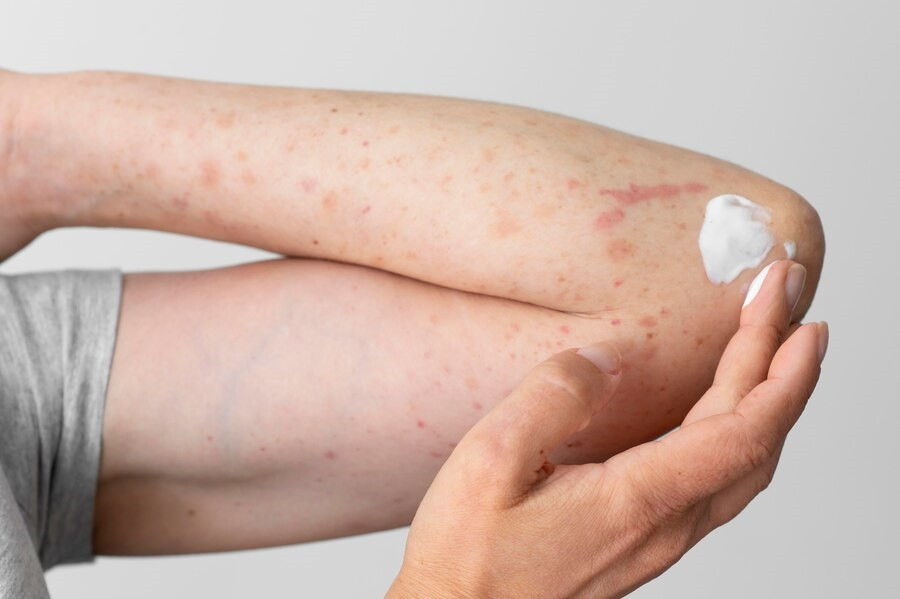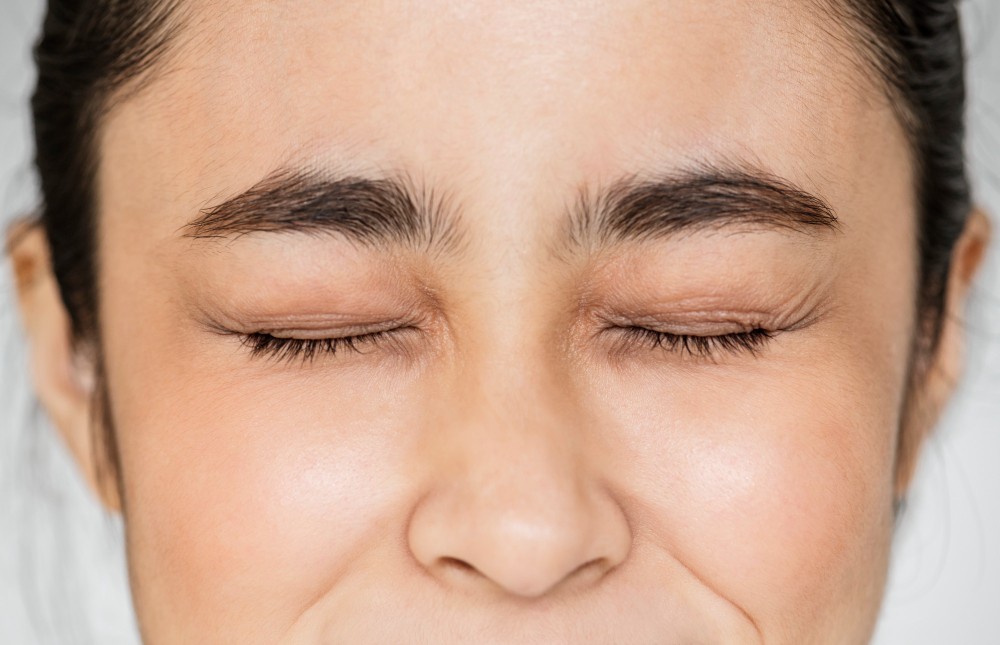Alergi kulit dapat terjadi sebagai respons sistem kekebalan tubuh yang berlebihan terhadap zat-zat yang umumnya tidak berbahaya, misalnya seperti serbuk sari, logam tertentu, bahan kimia dalam sabun, produk perawatan kulit, lateks, bulu hewan, dan lain sebagainya.
Respons berlebihan sistem kekebalan tubuh terhadap zat-zat tersebut bisa muncul dalam berbagai macam gejala, seperti kemerahan, pembengkakan, bersisik atau terbentuknya lepuhan.
Alergi kulit memiliki jenis yang berbeda-beda, dengan gejala yang berbeda pula. Ketahui perbedaan alergi kulit dan gejala yang menandainya.
Jenis-Jenis Alergi Kulit dan Gejalanya
Menurut para ahli, ada beberapa jenis alergi kulit yang umum dengan gejala yang bisa berbeda-beda, di antaranya:
Eksim (Dermatitis Atopik)
Eksim atau disebut juga dermatitis atopik adalah kondisi kronis yang bisa sangat memengaruhi kualitas hidup seseorang. Biasanya eksim dimulai pada masa kanak-kanak, dan bisa berlangsung sepanjang hidupnya.
Orang dengan dermatitis atopik memiliki kecenderungan terhadap risiko alergi makanan, alergi lain serta penyakit asma. Belum ada obat yang bisa menyembuhkan kondisi ini secara permanen. Adapun pengobatan dan perawatannya dilakukan untuk mengurangi gejala dan mencegah terbentuknya gejala baru.
Eksim bisa muncul di bagian tubuh mana saja, dengan gejala bervariasi di antaranya:
- Kulit kering dan pecah-pecah
- Gatal
- Ruam pada kulit
- Muncul benjolan kecil dan menonjol pada kulit yang berwarna cokelat atau hitam
- Adanya cairan yang keluar
- Kulit mengeras atau menebal
- Kulit berwarna lebih gelap di sekitar mata
- Kulit yang sensitif terhadap gesekan
Adapun untuk merawat gejala eksim, Anda disarankan menggunakan pelembap untuk mengurangi kekeringan dan gatal, menggunakan sabun berformula ringan, menggunakan salep kortikosteroid untuk mengurangi peradangan dan menghindari pemicu gejala.
Baca Juga: Perbedaan Antara Eksim dan Psoriasis
Dermatitis kontak
Dermatitis kontak adalah kondisi di mana kulit bereaksi terhadap zat tertentu di lingkungan sekitar yang dapat menyebabkan peradangan atau iritasi pada kulit. Reaksi ini bisa terjadi ketika kulit bersentuhan langsung dengan zat atau bahan tertentu yang bisa mengiritasi kulit, misalnya detergen, produk perawatan kulit, tanaman, bahan kimia dalam produk pembersih, logam atau zat-zat alergen lainnya.
Gejala dermatitis kontak bisa beragam, meliputi:
- Perubahan warna kulit alami menjadi merah keunguan atau lebih gelap
- Pembengkakan kulit seperti bentol-bentol menonjol di kulit sekitarnya
- Kulit terlihat bergelombang dengan dikelilingi jerawat kecil atau lepuhan
- Keluarnya cairan atau nanah
- Nyeri disertai sensasi perih atau terbakar
- Kulit bersisik
- Kulit gatal-gatal
Biduran (Urtikaria)
Bentol-bentol berwarna merah disertai gatal namun segera hilang dengan cepat disebut dengan biduran atau urtikaria. Biduran merupakan salah satu jenis alergi kulit yang umum dialami.
Gejalanya bisa bervariasi dari yang ringan hingga parah, seperti timbulnya benjolan berwarna merah yang terasa gatal, perubahan warna kulit menjadi putih saat benjolan ditekan. Biduran bisa disebabkan oleh banyak hal, di antaranya:
- Reaksi alergi terhadap makanan atau obat-obatan tertentu
- Rangsangan fisik seperti paparan udara dingin, udara panas, olahraga atau sinar matahari
- Gigitan serangga
- Respons terhadap serbuk sari
- Infeksi bakteri atau virus tertentu
Selain menghindari pemicunya, biasanya dibutuhkan obat antihistamin untuk membantu meredakan gatal-gatal dan gejala lainnya. Dalam kasus yang lebih parah seperti biduran kronis atau kambuhan, maka perawatan lebih lanjut dengan dokter atau ahli dermatologi dibutuhkan.
Baca Juga: Tanda-Tanda Jika Anda Alergi Makan Udang
Angioedema dan Hereditary Angioedema (HAE)
Angioedema termasuk jenis alergi kulit di mana kulit mengalami pembengkakan yang tidak disertai rasa gatal. Sekilas angioedema mirip dengan biduran, bedanya pada angioedema tidak disertai rasa gatal dan lebih sering terjadi di area jaringan lunak seperti kelopak mata, mulut, atau alat kelamin.
Angioedema biasanya disebabkan oleh reaksi alergi terhadap obat maupun makanan tertentu. Kondisi ini bisa muncul kembali atau ketika muncul bisa berlangsung hingga berhari-hari.
Hereditary Angioedema (HAE) memiliki gejala yang hampir mirip, namun kondisi ini merupakan kelainan genetik serius yang bisa menyebabkan pembengkakan di tangan, kaki, wajah, dinding usus atau dinding saluran pernapasan. Sangat penting untuk segera mencari pertolongan medis apabila Anda memiliki jenis alergi kulit yang satu ini.
Sangat penting untuk berkonsultasi dengan dokter atau ahli dermatologi saat menghadapi berbagai jenis alergi kulit. Dokter bisa mengidentifikasi pemicu dan juga merekomendasikan pengobatan yang tepat.
Manfaatkan layanan konsultasi kesehatan dengan dokter kami terkait alergi kulit melalui aplikasi Ai Care yang bisa diunduh di App Store atau Play Store.
Mau tahu informasi seputar penyakit lainnya? Cek di sini, ya!
- dr Nadia Opmalina
WebMD (2023). Skin Allergy Types and Triggers. Available from: https://www.webmd.com/allergies/skin-allergy-types-triggers
American College of Allergy, Asthma & Immunology. Skin Allergy. Available from: https://acaai.org/allergies/allergic-conditions/skin-allergy/
American Academy of Allergy, Asthma & Immunology. Skin Allergy. Available from: https://www.aaaai.org/conditions-treatments/allergies/skin-allergy
Pat Bass, MD (2023). What Are Skin Allergies?. Available from: https://www.verywellhealth.com/skin-allergies-4013947
Mayo Clinic (2023). Atopic dermatitis (eczema). Available from: https://www.mayoclinic.org/diseases-conditions/atopic-dermatitis-eczema/symptoms-causes/syc-20353273
Cleveland Clinic (2023). Contact Dermatitis. Available from: https://my.clevelandclinic.org/health/diseases/6173-contact-dermatitis
American Academy of Allergy, Asthma & Immunology. Hives. Available from: https://acaai.org/allergies/allergic-conditions/skin-allergy/hives/












